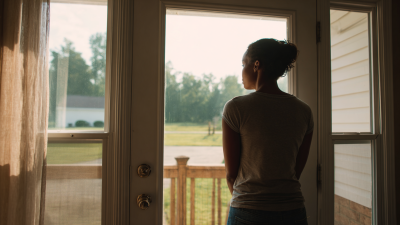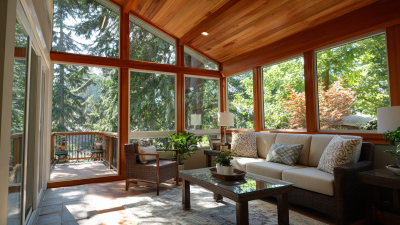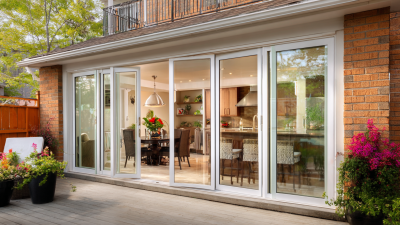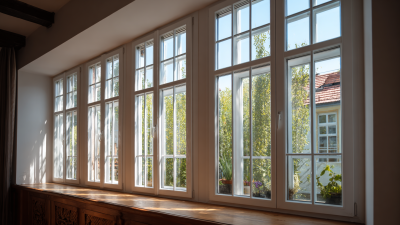The Ultimate Guide to Choosing Custom Made Sliding Doors for Every Home Style
In recent years, the demand for custom made sliding doors has surged, reflecting a key trend in home design and renovation. According to a report by the National Association of Home Builders (NAHB), over 70% of homeowners are seeking to personalize their living spaces, and custom features like sliding doors play a vital role in enhancing both functionality and aesthetics. These bespoke systems not only offer a seamless transition between indoor and outdoor spaces but also cater to diverse architectural styles, making them a popular choice for various home designs.
Furthermore, a study by Grand View Research highlights that the global sliding doors market is expected to reach $25 billion by 2027, driven by their versatility and the increasing preference for energy-efficient home solutions. Custom made sliding doors are often designed with advanced materials and technologies that improve insulation, reducing energy costs and increasing comfort within the home. As homeowners look to distinguish their properties while also investing in functional upgrades, understanding the nuances of choosing the right custom sliding doors becomes essential. This guide aims to assist homeowners in navigating their options, ensuring they select doors that not only meet their stylistic preferences but also enhance the overall livability of their homes.

Understanding Different Home Styles and Their Door Requirements
When selecting custom-made sliding doors, it's essential to consider the specific requirements of different home styles. For instance, modern homes often feature clean lines and minimalist aesthetics, which can be beautifully complemented by sleek, frameless sliding doors. These doors not only enhance the contemporary look but also maximize natural light, creating an open and airy atmosphere.
In contrast, traditional homes benefit from sliding doors that incorporate classic designs, such as decorative moldings and rich wood finishes. These elements help maintain the home's timeless charm while providing functionality and ease of access. Additionally, rustic-style homes may call for sliding barn doors, which add character and warmth through their robust materials and charming designs. By understanding these nuances in home styles, homeowners can make informed decisions that reflect their personal taste and enhance the overall design of their living spaces.
Materials and Finishes: Enhancing Aesthetic Appeal and Durability
When selecting custom-made sliding doors, the choice of materials and finishes plays a crucial role in enhancing both aesthetic appeal and durability. According to the American Institute of Architects, over 80% of homeowners prioritize aesthetics when choosing home features, making it essential to select the right finish that complements your home’s style. Popular materials include timber, aluminum, and fiberglass, each offering unique advantages. Timber provides a warm, traditional look but requires regular maintenance to protect against weather elements. In contrast, aluminum is known for its sleek modern appearance and durability, resisting warping and corrosion, which can extend the lifespan of your doors significantly.
Furthermore, the finish of these doors can dramatically impact not just aesthetics, but also energy efficiency and maintenance. A study by the U.S. Department of Energy highlights that high-performance finishes can improve insulation and reduce energy costs by up to 25%. For instance, low-E glass finishes not only enhance the visual quality with their reflective properties but also help maintain indoor temperatures, contributing to a more energy-efficient home. As consumers become more environmentally conscious, choosing finishes that combine aesthetics with sustainability is increasingly becoming a priority. Selecting the right combination of materials and finishes can transform sliding doors from functional elements into striking focal points that elevate the design of your home.
Design Options: Customization for Functionality and Style
When it comes to personalizing your home, custom made sliding doors can serve both functional and aesthetic purposes, allowing you to express your style while enhancing your space's practicality. Design experts indicate that homes featuring custom door solutions can increase property value by up to 5%, making them an investment worth considering. The options are vast, from selecting materials to finishes that complement your interior decor. Your sliding doors can be tailored to fit your home's style, whether it's modern, rustic, or traditional.
**Tips for Personalization**: When choosing your sliding doors, consider the surrounding environment. For instance, if you have extensive natural lighting, opt for translucent materials that enhance light diffusion while maintaining privacy. Additionally, think about hardware details, such as handles and tracks, which can be customized to add a touch of sophistication to your doors. Engage with professional designers who can provide insights into trends and functionality, ensuring your doors not only look great but also serve their purpose.
Moreover, innovative home technology has made customization more accessible than ever. For instance, as found in various market reports, many consumers are increasingly drawn to products that allow for real-time adjustments and personalization. Embrace these trends by researching smart sliding door systems that can be integrated into your home, providing both comfort and an element of modern design. Your space should reflect your unique style while remaining versatile and functional.
The Ultimate Guide to Choosing Custom Made Sliding Doors for Every Home Style
| Style | Material | Customization Options | Functionality | Price Range |
|---|---|---|---|---|
| Modern | Aluminum | Color, Size, Glass Type | Sliding, Multi-Panel | $800 - $1,500 |
| Traditional | Wood | Finish, Handles, Glass Inserts | Sliding, Bi-Fold | $1,200 - $2,500 |
| Contemporary | Fiberglass | Custom Sizes, Tinting | Sliding, Pocket | $1,000 - $2,000 |
| Rustic | Reclaimed Wood | Design, Hardware | Sliding, French | $1,500 - $3,000 |
| Minimalist | Glass | Frame Color, Size | Sliding | $900 - $1,800 |
Energy Efficiency and Insulation: Choosing the Right Sliding Doors
When selecting custom made sliding doors, energy efficiency and insulation should be at the forefront of your decision-making process. In a world where energy costs are continuously rising, choosing the right sliding doors can greatly contribute to your home’s overall energy performance. Look for doors with high insulation ratings, which indicate their ability to prevent heat loss in winter and keep your home cool during summer. Double or triple glazing is often recommended, as these layers of glass trap air between them, reducing thermal transfer and enhancing insulation.
Additionally, consider the materials used in the construction of the sliding doors. Vinyl, fiberglass, and wood-clad options often provide better energy efficiency compared to standard aluminum doors. Check for weatherstripping and thermal breaks, which can significantly reduce drafts and enhance comfort within your living space. By prioritizing energy-efficient sliding doors, you not only improve your home’s insulation but also contribute to a more sustainable environment, ultimately leading to lower utility bills and a more enjoyable indoor climate.
Maintenance Tips for Long-Lasting Custom Sliding Doors
Custom-made sliding doors can enhance the aesthetic appeal of any home, but their longevity largely depends on regular maintenance. According to a report by the National Association of Home Builders, homeowners who invest in consistent upkeep can extend the lifespan of their doors by up to 20%. Simple maintenance tasks like cleaning the tracks and inspecting seals can significantly reduce wear and tear, ensuring smoother operation and preventing costly repairs.
To maintain sliding doors effectively, it's essential to keep the tracks free of debris and lubricate the rollers periodically. The American Institute of Architects recommends using silicone-based lubricants, as they penetrate easily and do not attract dirt like petroleum-based products. Additionally, checking the weather stripping for wear can help maintain energy efficiency—an important factor, as energy-efficient doors can lead to savings of 10-15% on heating and cooling costs over time.
Regular maintenance not only protects the integrity of the doors but also enhances their functionality and performance.
Related Posts
-

Unlocking Home Protection and Energy Efficiency with Storm Doors
-

How to Choose the Perfect Patio Windows for Your Home Enhancement
-

Innovative Replacement Patio Doors Shaping the Future of Home Improvement at the 138th Canton Fair 2025
-

How to Choose the Best Custom Made Windows for Your Global Sourcing Needs: Insights and Tips
-

Innovative Examples of Storm Patio Doors for Modern Homes
-

How to Choose Vinyl Windows for Your Patio to Enhance Home Aesthetics